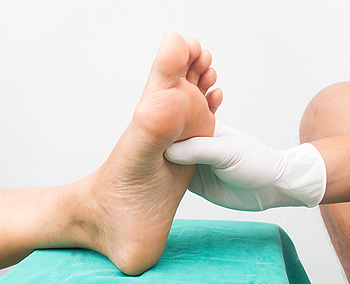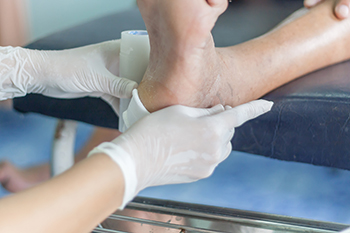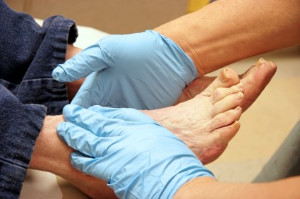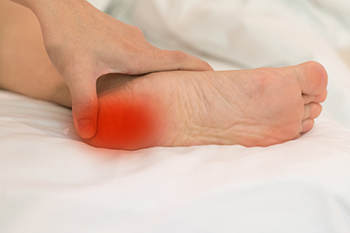Items filtered by date: June 2022
Causes of Peripheral Neuropathy

When the nerves in the extremities – commonly the feet – are damaged, it results in a condition known as peripheral neuropathy. Symptoms include numbness, tingling and burning pain. It can also affect your balance, coordination, and muscle strength. The numbness makes it difficult to notice sores and cuts on your feet that can develop into ulcers, or even gangrene. In rare cases, neuropathy has no recognizable cause, known as idiopathic neuropathy. But the most common cause of peripheral neuropathy is thought to be diabetes. High levels of blood sugar can damage the blood vessels that supply the nerves. The likelihood of developing this condition further increases with age, alcohol use, and smoking. Other factors that may contribute to peripheral neuropathy include low levels of vitamin B12, trauma to the nerves after surgery, an underactive thyroid gland, and genetics. In addition, certain infections, such as shingles, Lyme’s disease, and HIV may be causes as well. If you have peripheral neuropathy, please make an appointment with a podiatrist for regular examinations of your feet and treatment options.
Neuropathy
Neuropathy can be a potentially serious condition, especially if it is left undiagnosed. If you have any concerns that you may be experiencing nerve loss in your feet, consult with the foot specialists from Certified Foot Care. Our doctors will assess your condition and provide you with quality foot and ankle treatment for neuropathy.
What Is Neuropathy?
Neuropathy is a condition that leads to damage to the nerves in the body. Peripheral neuropathy, or neuropathy that affects your peripheral nervous system, usually occurs in the feet. Neuropathy can be triggered by a number of different causes. Such causes include diabetes, infections, cancers, disorders, and toxic substances.
Symptoms of Neuropathy Include:
- Numbness
- Sensation loss
- Prickling and tingling sensations
- Throbbing, freezing, burning pains
- Muscle weakness
Those with diabetes are at serious risk due to being unable to feel an ulcer on their feet. Diabetics usually also suffer from poor blood circulation. This can lead to the wound not healing, infections occurring, and the limb may have to be amputated.
Treatment
To treat neuropathy in the foot, podiatrists will first diagnose the cause of the neuropathy. Figuring out the underlying cause of the neuropathy will allow the podiatrist to prescribe the best treatment, whether it be caused by diabetes, toxic substance exposure, infection, etc. If the nerve has not died, then it’s possible that sensation may be able to return to the foot.
Pain medication may be issued for pain. Electrical nerve stimulation can be used to stimulate nerves. If the neuropathy is caused from pressure on the nerves, then surgery may be necessary.
If you have any questions, please feel free to contact our offices located in Larchmont and Brooklyn, NY . We offer the newest diagnostic and treatment technologies for all your foot care needs.
Symptoms of an Infected Foot Wound

It is beneficial to treat wounds on the feet as quickly as possible to avoid future health complications. Any cut or scrape on the bottom of the foot needs to be cleaned with an antiseptic, after the hands are thoroughly washed. This is followed by covering the cut with a dressing, and protecting it from getting wet. The cut will heal naturally, and eventually a scab will form. The foot may be wrapped by using tape to keep the bandage in place on the sole of the foot. Symptoms of an infected wound include redness surrounding the affected area, and it may begin to ooze a green or yellow fluid. Additionally, the wound may become painful, the entire foot may turn red, and swelling may increase. An infection on the foot may affect the entire body, and many people become lethargic. If you have a wound on your foot, it is strongly advised that you are under the care of a podiatrist who can properly treat this condition.
Wound care is an important part in dealing with diabetes. If you have diabetes and a foot wound or would like more information about wound care for diabetics, consult with the foot specialists from Certified Foot Care. Our doctors will assess your condition and provide you with quality foot and ankle treatment.
What Is Wound Care?
Wound care is the practice of taking proper care of a wound. This can range from the smallest to the largest of wounds. While everyone can benefit from proper wound care, it is much more important for diabetics. Diabetics often suffer from poor blood circulation which causes wounds to heal much slower than they would in a non-diabetic.
What Is the Importance of Wound Care?
While it may not seem apparent with small ulcers on the foot, for diabetics, any size ulcer can become infected. Diabetics often also suffer from neuropathy, or nerve loss. This means they might not even feel when they have an ulcer on their foot. If the wound becomes severely infected, amputation may be necessary. Therefore, it is of the upmost importance to properly care for any and all foot wounds.
How to Care for Wounds
The best way to care for foot wounds is to prevent them. For diabetics, this means daily inspections of the feet for any signs of abnormalities or ulcers. It is also recommended to see a podiatrist several times a year for a foot inspection. If you do have an ulcer, run the wound under water to clear dirt from the wound; then apply antibiotic ointment to the wound and cover with a bandage. Bandages should be changed daily and keeping pressure off the wound is smart. It is advised to see a podiatrist, who can keep an eye on it.
If you have any questions, please feel free to contact our offices located in Larchmont and Brooklyn, NY . We offer the newest diagnostic and treatment technologies for all your foot care needs.
Are You Suffering From Ingrown Toenails?
How Diabetes Can Affect the Feet

Diabetes occurs when the body does not produce sufficient insulin or use it properly, which causes blood sugar levels to rise above normal. Diabetes can affect the health of the feet as well as many other parts of the body. Uncontrolled high blood sugar levels can damage blood vessels, reduce the blood flow to feet, and have serious consequences. Diabetic neuropathy is a type of nerve damage that affects the feet and legs and that many of those with diabetes develop. Such nerve damage can cause tingling and numbness in the feet, and one might not feel pain from a foot problem - a key warning sign that something is amiss in the body. Infections can arise, and if not tended to and healed, can lead to gangrene where tissue dies from lack of blood flow. Another complication of diabetes is peripheral vascular disease, a circulation disorder that limits blood flow to the legs and feet. Healing takes longer with inadequate blood flow, putting one at risk for infections. It is important for those with diabetes to practice good foot care. Beyond taking prescribed diabetes medications and monitoring blood sugar levels, diabetics should keep their feet clean, dry, and moisturized, wear well-fitting shoes, examine feet regularly for any cuts, sores, or blisters, maintain a healthy body weight, and exercise regularly. If you have diabetes, it is suggested that you include a podiatrist on your team of doctors so they can help you catch any foot problems you may not feel or know about, treat any issues you are aware of, and help you maintain healthy feet.
Diabetic foot care is important in preventing foot ailments such as ulcers. If you are suffering from diabetes or have any other concerns about your feet, contact the foot specialists from Certified Foot Care. Our doctors can provide the care you need to keep you pain-free and on your feet.
Diabetic Foot Care
Diabetes affects millions of people every year. The condition can damage blood vessels in many parts of the body, especially the feet. Because of this, taking care of your feet is essential if you have diabetes, and having a podiatrist help monitor your foot health is highly recommended.
The Importance of Caring for Your Feet
- Routinely inspect your feet for bruises or sores.
- Wear socks that fit your feet comfortably.
- Wear comfortable shoes that provide adequate support.
Patients with diabetes should have their doctor monitor their blood levels, as blood sugar levels play such a huge role in diabetic care. Monitoring these levels on a regular basis is highly advised.
It is always best to inform your healthcare professional of any concerns you may have regarding your feet, especially for diabetic patients. Early treatment and routine foot examinations are keys to maintaining proper health, especially because severe complications can arise if proper treatment is not applied.
If you have any questions please feel free to contact our offices located in Larchmont and Brooklyn, NY . We offer the newest diagnostic and treatment technologies for all your foot and ankle needs.
Children, Physical Activity, and Sever’s Disease

The heel condition that is referred to as Sever’s disease generally affects children and young teenagers who are involved in sporting activities. The heel can often feel sore when Sever’s disease is present, and it may be difficult to walk. It is defined as a condition that affects the growth plate in the heel, and can be confirmed by having a physical examination performed. Relief is often found when the activity that caused the condition is stopped, and the heel is frequently rested. It is important to practice specific stretches once the heel feels better, and this may help to accelerate the recovery process. Many patients choose to wear a heel cushion in their shoe which may be able to provide additional padding. If your child is affected by Sever’s disease, it is advised that a podiatrist be consulted for proper prevention and healing tips.
Sever's disease often occurs in children and teens. If your child is experiencing foot or ankle pain, see the foot specialists from Certified Foot Care. Our doctors can treat your child’s foot and ankle needs.
Sever’s Disease
Sever’s disease is also known as calcaneal apophysitis, which is a medical condition that causes heel pain I none or both feet. The disease is known to affect children between the ages of 8 and 14.
Sever’s disease occurs when part of the child’s heel known as the growth plate (calcaneal epiphysis) is attached to the Achilles tendon. This area can suffer injury when the muscles and tendons of the growing foot do not keep pace with bone growth. Therefore, the constant pain which one experiences at the back of the heel will make the child unable to put any weight on the heel. The child is then forced to walk on their toes.
Symptoms
Acute pain – Pain associated with Sever’s disease is usually felt in the heel when the child engages in physical activity such as walking, jumping and or running.
Highly active – Children who are very active are among the most susceptible in experiencing Sever’s disease, because of the stress and tension placed on their feet.
If you have any questions, please feel free to contact our offices located in Larchmont and Brooklyn, NY . We offer the newest diagnostic and treatment technologies for all your foot and ankle injuries.

